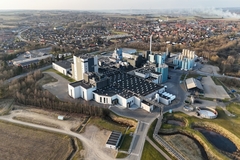
- Industry news
Industry news
- Category news
Category news
- Reports
- Key trends
- Multimedia
Multimedia
- Journal
- Events
- Suppliers
- Home
- Industry news
Industry news
- Category news
Category news
- Reports
- Key trends
- Multimedia
Multimedia
- Events
- Suppliers
FDA Traces Salmonella Source to Peanut Corporation of America

The American Peanut Council joined the U.S. Food and Drug Administration (FDA) in urging consumers to postpone eating products made with peanut butter pending information about which products contain ingredients produced by a plant in Blakely, Georgia. Products from that plant have been linked to salmonella contamination in Minnesota, Georgia and Connecticut.

19/01/09 The Food and Drug Administration (FDA) is conducting a very active and dynamic investigation into the source of the Salmonella Typhimurium outbreak. At this time, the FDA has traced a source of Salmonella Typhimurium contamination to a plant owned by Peanut Corporation of America (PCA), which manufactures both peanut butter that is institutionally served in such settings as long-term care facilities and cafeterias, and peanut paste—a concentrated product consisting of ground, roasted peanuts—that is distributed to food manufacturers to be used as an ingredient in many commercially produced products including cakes, cookies, crackers, candies, cereal and ice cream.
The FDA has notified PCA that product samples originating from its Blakely, Ga., processing plant have been tested and found positive for Salmonella by laboratories in the states of Minnesota and Georgia. The state of Minnesota has reported to FDA that its samples of King Nut peanut butter are a genetic match to the strain of Salmonella that has caused illnesses in that state and around the country. King Nut is a distributor of PCA product.
On January 16, PCA expanded its voluntary recall to include all peanut butter produced on or after August 8, 2008, and all peanut paste produced on or after September 26, 2008, in its Blakely, Ga., plant because of potential Salmonella contamination. The product being recalled is sold by PCA in bulk packaging in containers ranging in size from five to 1700 pounds. The peanut paste is sold in sizes ranging from 35-pound containers to product sold by the tanker container. These products are not sold directly to consumers. PCA has stopped all production at its Blakely, Ga. plant as the FDA continues its investigation into the source of the Salmonella contamination.
Based on this information, and on the current state of the investigation, the FDA recommends that consumers avoid eating products that have been recalled and discard them.
Because identification of products subject to recall is continuing, the FDA urges consumers to postpone eating commercially-prepared or manufactured peanut butter-containing products and institutionally-served peanut butter until further information becomes available about which products may be affected. Efforts to specifically identify those products are ongoing.
At this time, there is no indication that any national name brand jars of peanut butter sold in retail stores are linked to the PCA recall. As the investigation continues over the weekend, and into next week, the FDA will be able to update the advice based on new sampling and distribution information.
The FDA is working closely with members of the food industry to narrow this advice and to publish a detailed list of implicated products as soon as possible. The FDA is encouraging manufacturers to help inform consumers about whether their products could have contained commercially prepared peanut butter or peanut paste from PCA. Also, if manufacturers know their products do not contain ingredients from PCA, they may wish to inform consumers of that fact. Retailers should stop selling products which have been recalled.
The American Peanut Council joined the U.S. Food and Drug Administration (FDA) in urging consumers to postpone eating products made with peanut butter pending information about which products contain ingredients produced by a plant in Blakely, Georgia. Products from that plant have been linked to salmonella contamination in Minnesota, Georgia and Connecticut. Retail peanut butter brands on grocery shelves are safe and need not be avoided. Consumers should visit www.fda.gov for a list of affected products in the days ahead.
"While approximately 99.9 per cent of peanut butter and peanut paste in America did not come from the Blakely plant, consumers must err on the side of safety until the FDA finds out exactly which products are and are not affected," said Patrick Archer, President of the American Peanut Council. "This is the best way to ensure continued confidence in the safety, quality and nutritional benefits of American peanut products."
The FDA has traced one likely source of salmonella contamination to a plant owned by Peanut Corporation of America (PCA), where the company manufactures peanut butter and peanut paste, a concentrated product consisting of ground, roasted peanuts. PCA has announced a voluntary recall of all peanut butter produced at the plant on or after August 8, 2008, all peanut paste produced on or after September 26, 2008, and 21 lots of peanut butter produced on or after July 1, 2008.
While none of this product was sold at retail to the general public, some of the peanut butter and peanut paste manufactured by PCA is used as ingredients in products such as cookies, crackers, cereal, candy and ice cream. Some of the peanut butter is also distributed in bulk for further manufacturing into products containing peanut butter and to large institutions, such as nursing homes and hospitals.










